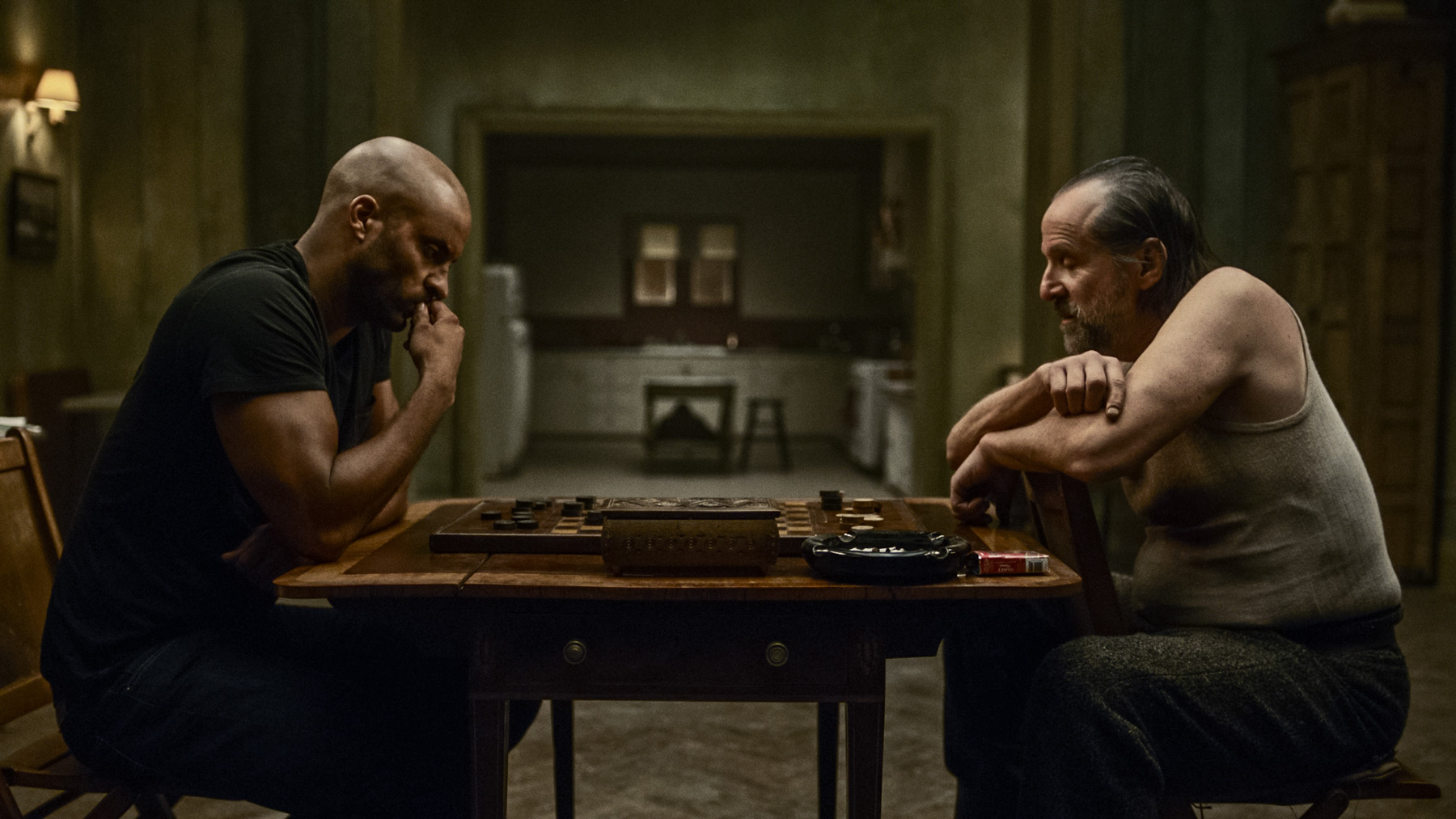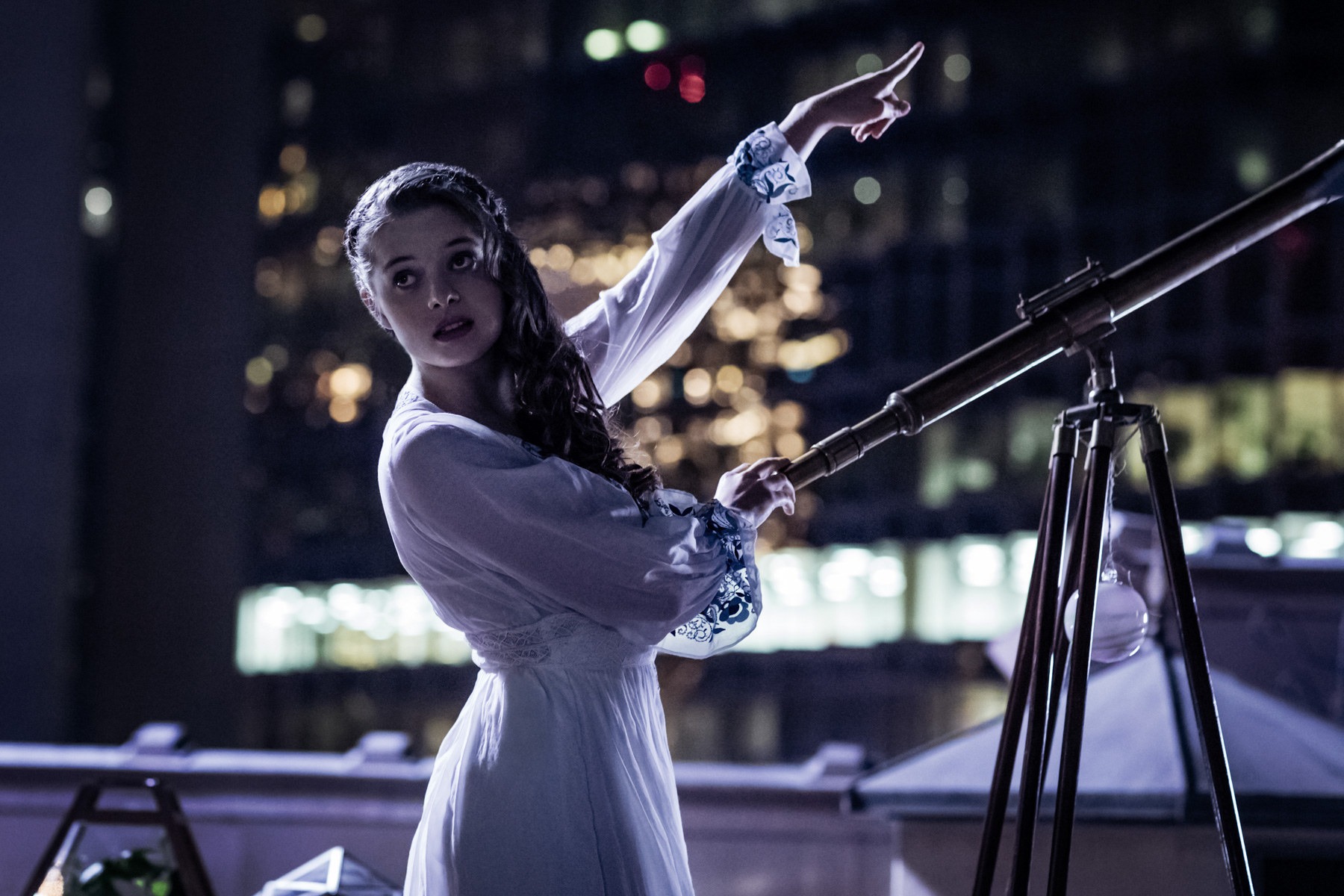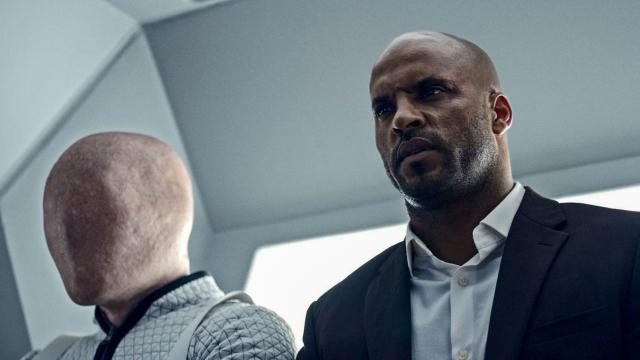The biggest hazard a show like American Gods can run into is making it feel like you’re just waiting on the freaky cool stuff to happen. That obstacle never presents itself in the first four episodes of Starz’ new fantasy series, which feels quite unlike anything on television right now. Strangeness is always just an eye-blink away.
Shadow Moon and one of Technical Boy’s minions. Image: Starz
Premiering on May 1, American Gods adapts Neil Gaiman’s award-winning 2001 novel for television, focusing on ex-con Shadow Moon and his journey into the mysteries of faded and rising gods who live among us. Viewers meet Shadow (Ricky Whittle) while he’s still in gaol, days away from a release that will reunite him with wife Laura (Emily Browning). But Laura’s sudden death gets him sprung early and, on his way to her funeral, Shadow meets a mysterious elder con man called Mr Wednesday. Mr Wednesday hires Shadow to be his bodyguard and the younger man soon learns that, no surprise, his new employer and the people he meets with are more than they seem. What follows are my impressions of the series after watching the first four episodes.
Where the Shadow in the novel seemed more like a sad sack, the show’s scripts and Whittle’s performance impart a questioning restlessness to the main character. He’s suffered through gaol time and bereavement, finding himself swept up into happenings he struggles to process. Whittle communicates a sense of curiosity and doubt that’s crucial for the show’s mechanics, but he never comes across as naive. He’s charming and clever but comes into contact with beings that have those qualities in otherworldly proportions.
Overall, the show’s performances transmit an appealing mix of philosophy and snark. Ian McShane shines as the show’s otherworldly alpha persona, coming across as rascally, crude and wise. His Mr Wednesday moves easily from being a lecherous old goat one minute and an itinerant preacher-philosopher the next. McShane is great fun to watch and I can’t wait to see him play through the scenes where more grandiose aspects of his character’s nature get revealed. Gillian Andersen is also great as neo-goddess Media, channelling the hypnotic allure of modern entertainment’s glowing screens and disembodied voices with a wry Southern Belle affectation that seems to reference Mae West.
American Gods gets shot in a hyper-stylised mode that feels slightly distended at times: The colours flirt with being too intense and some camera angles will make you want to tilt your head to better understand the visual data. It exhibits much of the same whimsy seen in other shows where executive producer Bryan Fuller was involved. But, when compared to, say, Wonderfalls, that quirkiness is rendered in darker, more lascivious tones shot through with mischief and ponderousness. These gods don’t necessarily care if humans hurt themselves with their worship. Take, for example, the first scene with spider god Anansi, played by Orlando Jones. During his journey to these shores in the 17th century, he tells Africans in the hold of a slave ship of the centuries of institutionalised racism that awaits them and their descendants. Incited by his angry monologue — easily one of the best moments in the show’s early going — they burn the ship and die along with their would-be enslavers. Anansi crawls to dry land in arachnid form, stepping off a blackened plank of a wood that is, essentially, the remains of a massive burnt offering. His smaller insectoid head makes it impossible to read emotion here and what we’re left with is the impassive fact that he is alive and his worshippers are not.
Over the last month, I’ve been re-reading American Gods for the first time in more than a decade. Parts of the book gets transliterated almost verbatim onto the screen and, because they aren’t always presented in the same order, the effect is a little disconcerting. I’ve also been struck by rediscovering how horny the book is. The show feels even randier; there’s full frontal nudity for men and women and the idea of physical intimacy as a gateway to the divine constantly hums through the episodes I’ve watched. The intimacy isn’t just sex, either. When Russian god Czernobog makes a bet with Shadow over a checkers game, his aim is to win the right to smash Shadow’s head with his now silent sledgehammer. Despite all this, American Gods doesn’t sublimate its thematic concerns underneath the sex and violence.

Shadow Moon and Czernobog. Image: Starz.
American Gods finds its notional niche in the fact that people have progressed beyond the need for antiquarian mythologies but still move through lives where concepts and practices have power and influence over them. Ancient mythologies came into being as ways to understand the natural world and human behaviour. Stories about a temperamental god’s weapons slashing across the night explained lightning and another deity’s mandated procession across the sky across gave logic to the sun’s journey from east to west.

Erika Kaar as Zorya Polunochnaya. Image: Starz.
The advance of science melted away these faith systems but not the urge that created them. Our modern religious practices are much tamer descendants of wilder forms of worship that preceded them. Broadly speaking, humanity still needs to think about something bigger than our individual selves. Using the conceit of old celestial entities and the modern gods that have supplanted them, the TV adaptation of American Gods explores how that metaphysical tendency rumbles through the American subconscious. Moreover, it aims the astringent truth at the heart of faith: Allowing yourself to believe in things or people opens you up to being hustled.
A biblical passage from the Book of Hebrews defines faith as the substance of things hoped for, the evidence of things not seen. In seeing impossible things and meeting the personas that traffic in such feats, Shadow takes a headlong plunge into what it means to believe in something and learning how valuable that power is. American Gods is a genre show that feels well and truly fantastical because it’s concerned with the improbability of faith and belief. There’s a poetically lyrical and loopily existential energy to this show, playing out in moments where Mr Wednesday holds forth on America as a collective work of imagination. It’s a place that’s sold itself as a land where people’s lives and practices can be reinvented, making it fertile ground for the impulses to imbue and pull meaning out of phenomena. But the best part of American Gods is how it reminds us that fisticuffs, coitus, theft, breaking bread and drunken carousing can all get human beings closer to our gods, who may be a lot more like us than we expect.
